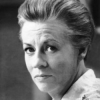Uta Hagen

Uta Hagen
Uta Thyra Hagenwas a German American actress and drama teacher. She originated the role of Martha in the 1962 Broadway premiere of Who's Afraid of Virginia Woolf? by Edward Albee. Because Hagen was on the Hollywood blacklist, in part because of her association with Paul Robeson, her film opportunities dwindled and she focused her career on New York theater. She twice won the Tony Award for Best Actress in a Play and received a Special Tony Award for Lifetime Achievement...
NationalityGerman
ProfessionStage Actress
Date of Birth12 June 1919
CityGottingen, Germany
CountryGermany
It must be noted that it is often the colleague or direct disciple of a new thinker who gets stuck in literal interpretations of the work, tending to freeze the new ideas and language into an inflexible, static condition.
I love going to the movies; I love watching good movie actors. They must know something I don't.
I love playing Chekhov. That's the hardest; that's why I love it most.
Working with Brando was fun. It was like a tennis match. We played unbelievably well together.
We were not allowed to say, Screw, but we could say, Hump the hostess, because hump is in Shakespeare.
We had a relationship that lasted 44 years. Herbert and I lived together 10 years before we were married. He always gave me a little heart for whatever anniversary.
For some strange reason, we believe that anyone who lived before we were born was in some peculiar way a different kind of human being from any we have come in contact with in our own lifetime. This concept must be changed; we must realize in our bones that almost everything in time and history has changed except the human being.
The need to be loved and protected is at a peak when we feel abandoned and are particularly vulnerable to difficult circumstances.
Thoughts and feelings are suspended in a vacuum unless they instigate and feed the selected actions, and it is the characters actions which reveal the character in the play.
To rebel or revolt against the status quo is in the very nature of an artist.
One cannot demand of art that it pay you in any other way than in the satisfaction of the work itself.
If you want a bourgeois existence, you shouldn't be an actor. You're in the wrong profession.
Once in a while, there's stuff that makes me say, That's what theatre's about. It has to be a human event on the stage, and that doesn't happen very often.
All tedious research is worth one inspired moment.